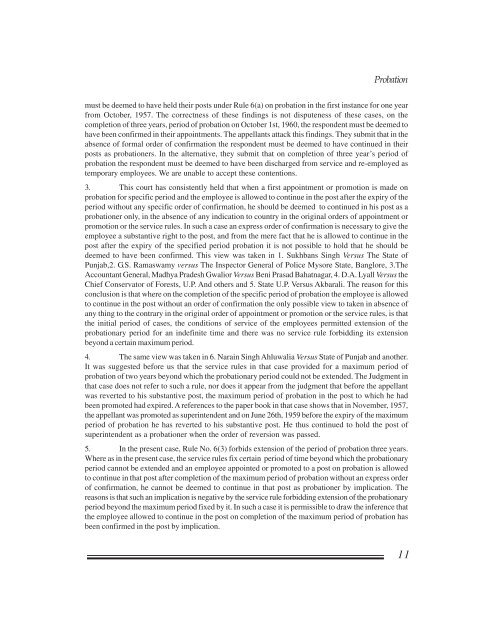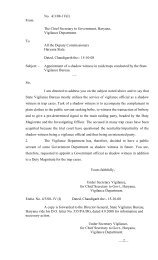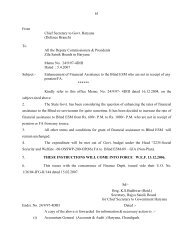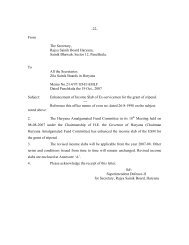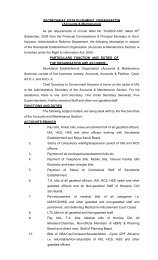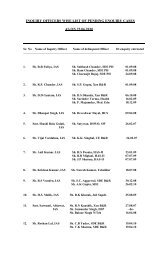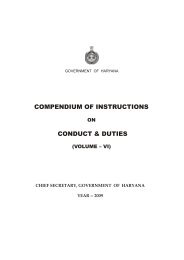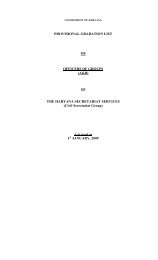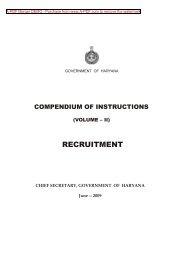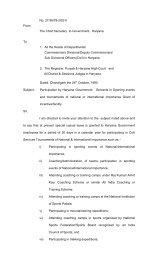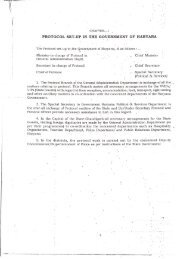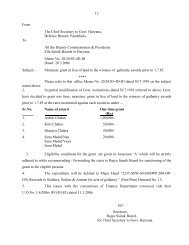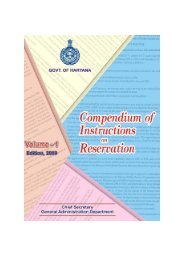- Page 1: A-PDF Merger DEMO : Purchase from w
- Page 5 and 6: (vi)1 2 3 412. No. 8/5/94-2GSI Prob
- Page 7 and 8: (viii)1 2 3 438. No. 43/79/92-5GSI
- Page 9 and 10: (x)1 2 3 465. No. 6/47/98—1GSI Re
- Page 11 and 12: (xii)1 2 3 488. No. G.S.R. 69/Const
- Page 13 and 14: (xiv)1 2 3 4114. No. 23/572001-2GSI
- Page 15 and 16: (xvi)1 2 3 4140. No. 4348-2GSI-72/2
- Page 17 and 18: (xviii)1 2 3 4166. 3556&4 th-,l-&I&
- Page 19 and 20: (xx)1 2 3 4190. 32@219@95&4 thú,l
- Page 21 and 22: Compendium of Instructions on Servi
- Page 23 and 24: Compendium of Instructions on Servi
- Page 25 and 26: Compendium of Instructions on Servi
- Page 27 and 28: Compendium of Instructions on Servi
- Page 29: Compendium of Instructions on Servi
- Page 33 and 34: Compendium of Instructions on Servi
- Page 35 and 36: Compendium of Instructions on Servi
- Page 37 and 38: Compendium of Instructions on Servi
- Page 39 and 40: Compendium of Instructions on Servi
- Page 41 and 42: Compendium of Instructions on Servi
- Page 43 and 44: Compendium of Instructions on Servi
- Page 45 and 46: Compendium of Instructions on Servi
- Page 47 and 48: Compendium of Instructions on Servi
- Page 49 and 50: Compendium of Instructions on Servi
- Page 51 and 52: Compendium of Instructions on Servi
- Page 53 and 54: Compendium of Instructions on Servi
- Page 55 and 56: Compendium of Instructions on Servi
- Page 57 and 58: Compendium of Instructions on Servi
- Page 59 and 60: Compendium of Instructions on Servi
- Page 61 and 62: Compendium of Instructions on Servi
- Page 63 and 64: Compendium of Instructions on Servi
- Page 65 and 66: Compendium of Instructions on Servi
- Page 67 and 68: Compendium of Instructions on Servi
- Page 69 and 70: Compendium of Instructions on Servi
- Page 71 and 72: Compendium of Instructions on Servi
- Page 73 and 74: Compendium of Instructions on Servi
- Page 75 and 76: Compendium of Instructions on Servi
- Page 77 and 78: Compendium of Instructions on Servi
- Page 79 and 80: Compendium of Instructions on Servi
- Page 81 and 82:
Compendium of Instructions on Servi
- Page 83 and 84:
Compendium of Instructions on Servi
- Page 85 and 86:
Compendium of Instructions on Servi
- Page 87 and 88:
Compendium of Instructions on Servi
- Page 89 and 90:
Compendium of Instructions on Servi
- Page 91 and 92:
Compendium of Instructions on Servi
- Page 93 and 94:
Compendium of Instructions on Servi
- Page 95 and 96:
Compendium of Instructions on Servi
- Page 97 and 98:
Compendium of Instructions on Servi
- Page 99 and 100:
Compendium of Instructions on Servi
- Page 101 and 102:
Compendium of Instructions on Servi
- Page 103 and 104:
Compendium of Instructions on Servi
- Page 105 and 106:
Compendium of Instructions on Servi
- Page 107 and 108:
Compendium of Instructions on Servi
- Page 109 and 110:
Compendium of Instructions on Servi
- Page 111 and 112:
Compendium of Instructions on Servi
- Page 113 and 114:
Compendium of Instructions on Servi
- Page 115 and 116:
Compendium of Instructions on Servi
- Page 117 and 118:
Compendium of Instructions on Servi
- Page 119 and 120:
Compendium of Instructions on Servi
- Page 121 and 122:
Compendium of Instructions on Servi
- Page 123 and 124:
Compendium of Instructions on Servi
- Page 125 and 126:
Compendium of Instructions on Servi
- Page 127 and 128:
Compendium of Instructions on Servi
- Page 129 and 130:
Compendium of Instructions on Servi
- Page 131 and 132:
Compendium of Instructions on Servi
- Page 133 and 134:
Compendium of Instructions on Servi
- Page 135 and 136:
Compendium of Instructions on Servi
- Page 137 and 138:
Compendium of Instructions on Servi
- Page 139 and 140:
Compendium of Instructions on Servi
- Page 141 and 142:
Compendium of Instructions on Servi
- Page 143 and 144:
Compendium of Instructions on Servi
- Page 145 and 146:
Compendium of Instructions on Servi
- Page 147 and 148:
Compendium of Instructions on Servi
- Page 149 and 150:
Compendium of Instructions on Servi
- Page 151 and 152:
Compendium of Instructions on Servi
- Page 153 and 154:
IIICONFIRMATION
- Page 155 and 156:
ConfirmationCopy of letter No. 1040
- Page 157 and 158:
ConfirmationCopy of Punjab Governme
- Page 159 and 160:
IVSENIORITY
- Page 161 and 162:
SeniorityCopy of letter No. 3130-E-
- Page 163 and 164:
Seniority(Published in the Punjab G
- Page 165 and 166:
Seniority(2) The inter-se-seniority
- Page 167 and 168:
Seniority(Published in the Haryana
- Page 169 and 170:
Seniority(b)(ii)by transfer or depu
- Page 171 and 172:
Seniority(f)in the case of members
- Page 173 and 174:
SeniorityAPPENDIX 'B'[See Rule 13 (
- Page 175 and 176:
Seniority3. It is also pointed out
- Page 177 and 178:
SeniorityØekad 1524&2 th-,l-&I&71@
- Page 179 and 180:
SeniorityCopy of letter No. 2379-2G
- Page 181 and 182:
izs"kdlsok esa]Øekad 401&2 thú,l
- Page 183 and 184:
Seniority"APPENDIX"[See Rule 13 (I)
- Page 185 and 186:
SeniorityAPPENDIX 'B'[See Rule 13 (
- Page 187 and 188:
SeniorityLVSuksxzkQj ds in ij lh/k
- Page 189 and 190:
Seniority(f)length of service in th
- Page 191 and 192:
VRETRENCHED/SURPLUS
- Page 193 and 194:
Retrenched/SurplusNo. 23/3/81-4GS-I
- Page 195 and 196:
Retrenched/SurplusFromToNo. 23/10/8
- Page 197 and 198:
Retrenched/SurplusNo. 23/10/88-2GS-
- Page 199 and 200:
Retrenched/Surplustaken.ToIt is the
- Page 201 and 202:
Retrenched/Surplus1 2 3 4 522. Sh.
- Page 203 and 204:
Retrenched/Surplus1 2 3 4 5104. Sh.
- Page 205 and 206:
Retrenched/SurplusFromToNo. 23/27/9
- Page 207 and 208:
Retrenched/SurplusFromToNo. 23/1/92
- Page 209 and 210:
Retrenched/SurplusØekad 23@1@92&2
- Page 211 and 212:
Retrenched/SurplusNo. 23/1/92-2GSII
- Page 213 and 214:
Retrenched/Surplusfollowing decisio
- Page 215 and 216:
Retrenched/SurplusFromToNo. 23/5/20
- Page 217 and 218:
Retrenched/SurplusFromToSubject:Sir
- Page 219 and 220:
Retrenched/SurplusFromToNo. 23/5/20
- Page 221 and 222:
Retrenched/SurplusFromToSubject:Sir
- Page 223 and 224:
Retrenched/SurplusFromToNo. 23/5/20
- Page 225 and 226:
Retrenched/SurplusA copy is forward
- Page 227 and 228:
Retrenched/SurplusA copy is forward
- Page 229 and 230:
Retrenched/Surplusthe demand they s
- Page 231 and 232:
Retrenched/SurplusFromToNo. 23/5720
- Page 233 and 234:
Retrenched/SurplusHARYANA GOVERNMEN
- Page 235 and 236:
Retrenched/SurplusGOVERNMENT OF HAR
- Page 237 and 238:
Retrenched/SurplusHARYANA GOVERNMEN
- Page 239 and 240:
Retrenched/SurplusFromToNo. 6/32/20
- Page 241 and 242:
Hkkx IIIgfj;k.kk ljdkjlkekU; iz'kkl
- Page 243 and 244:
VIRESIGNATION
- Page 245 and 246:
ResignationCopy of U.O. Letter No.
- Page 247 and 248:
Resignationthere is likelihood of t
- Page 249 and 250:
ResignationCopy of Punjab Circular
- Page 251 and 252:
ResignationCopy of Punjab Governmen
- Page 253 and 254:
ResignationCopy of letter No. 2050-
- Page 255 and 256:
ResignationFromToNo. 4348-2GSI-72/2
- Page 257 and 258:
Resignationprovisions of Rule 76 of
- Page 259 and 260:
izs”kdlsok esaØekad 5045&2 th-,l
- Page 261 and 262:
Resignation(ii)In cases where fresh
- Page 263 and 264:
ResignationFromToNo. 13/5/96-2GS-II
- Page 265 and 266:
ExtensionVIIEXTENSION247
- Page 267 and 268:
ExtensionCopy of letter No. 8562-G-
- Page 269 and 270:
Extensioncase where the case does n
- Page 271 and 272:
Extension[Published in the Punjab G
- Page 273 and 274:
Extension(d)possesses the requisite
- Page 275 and 276:
Extensionyears.Provided that the to
- Page 277 and 278:
ExtensionAPPENDIX 'A'[See Rule 13 (
- Page 279 and 280:
ExtensionCopy of Punjab Government
- Page 281 and 282:
Extension(v)Once it is decided to r
- Page 283 and 284:
ExtensionFromToSubject:—Sir,No. 4
- Page 285 and 286:
Extensionljdkj ds ifji=k Øekad 440
- Page 287 and 288:
ExtensionFromToNo. 113-4GSl-73/1611
- Page 289 and 290:
Extensionla[;k 5663&4 th-,l- I&73@2
- Page 291 and 292:
Extensionizs"kdlsok esafo"k; %egksn
- Page 293 and 294:
Extension(3) there has been a marke
- Page 295 and 296:
Extension(iii)gazetted employees th
- Page 297 and 298:
Extensionizs"kdv'kk- Øekadfnukadfo
- Page 299 and 300:
ExtensionØekad 3575&4 th- ,l- &I&7
- Page 301 and 302:
Extensionfo"k; %&vfuok;Z lsok fuo`f
- Page 303 and 304:
ExtensionORDERWhereas it is conside
- Page 305 and 306:
Extensionfn;k tk lds A ijUrq ;g ns[
- Page 307 and 308:
Extensionizs"kdlsok esa]fo"k; %&egk
- Page 309 and 310:
ExtensionØekad 32@198@83&4&th-,l-&
- Page 311 and 312:
Extension,d izfr lHkh foRrk;qDrksa
- Page 313 and 314:
Extension(4) ;fn fdlh dkj.ko'k deZp
- Page 315 and 316:
Extension;g fgnk;r lHkh lEcfU/r ds
- Page 317 and 318:
ExtensionA copy is forwarded to the
- Page 319 and 320:
Extension,d izfr fuEufyf[kr dks lwp
- Page 321 and 322:
Extensionizs"kdlsok esa]fo"k; %&egk
- Page 323 and 324:
ExtensionFromToNo. 32/179/89-4GSITh
- Page 325 and 326:
ExtensionA copy is forwarded to the
- Page 327 and 328:
ExtensionHARYANA GOVERNMENTGENERAL
- Page 329 and 330:
Extension70% good or above reports
- Page 331 and 332:
Extension,d izfr lHkh foRrk;qDr@vk;
- Page 333 and 334:
Extension,d izfr lHkh foRrk;qDr@vk;
- Page 335 and 336:
ExtensionToAll the Financial Commis
- Page 337 and 338:
ExtensionNo.32/33-SP/99-4GSIFromThe
- Page 339 and 340:
Extension3- blds vfrfjDRk ;g Hkh Li
- Page 341 and 342:
ExtensionA copy each is forward to
- Page 343 and 344:
ExtensionFromToNo. 32/189/2000-4GSI
- Page 345 and 346:
ExtensionFromToNo. 32/257/2002-4GSI
- Page 347 and 348:
Extensionizs"kdlsok esafo"k; %&Øek
- Page 349 and 350:
ExtensionFromToNo 34/1/2006-4GSIThe
- Page 351 and 352:
Extensionthe employee should submit
- Page 353 and 354:
ExtensionFromNo. 34/1/2006-4GSIThe
- Page 355 and 356:
ExtensionEndst. No. 34/1/2006-4GSI
- Page 357:
ExtensionEndst. No. 32/01/2009-4GSI


